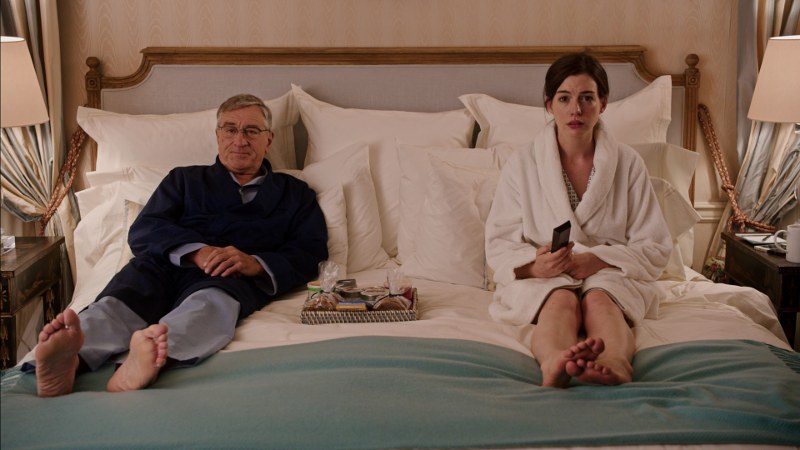Be honest – how many hours a day do you sleep? If you’re one of the people who believe that a good night’s sleep is an unnecessary luxury, you’re on a quick path towards a burnout and a complete collapse. It is shown that long-term neglect of your organism’s natural need for quality rest can cripple your ability to concentrate on your work and perform well.
Sleep deprivation is so common nowadays that it was also touched upon by the popular movie The Intern, in which Robert de Niro plays Ben Whittaker, a lively retiree on an internship in a successful start-up company. Ben is trying to get used to his new boss, Jules Ostin, the founder and CEO of the company, played by Anne Hathaway. For Jules, a lack of sleep due to work is a normal part of her life. When her mother, who is a sleep researcher, informs her that women after forty who sleep less than six hours a day are 38% more likely to gain weight, Jules groans: “But I haven’t slept in two years!” Though the movie handles the troubles of modern-day entrepreneurs in a very light-hearted and comical manner, it also subtly warns us about the true dangers of work without proper rest.

The great sleep revolution
Professional studies show that there’s a direct connection between lack of sleep and many health issues or work performance loss. If you’ve answered the question at the beginning of this article with ‘less than seven or eight hours’, it’s a good time to make a radical change in your life.
Arianna Huffington, the co-founder and editor-in-chief of The Huffington Post and one of the most successful businesswomen in the United States, advises the same. She definitely knows what she’s talking about because her own workaholism led her to a complete breakdown. In her latest book, The Sleep Revolution, she addresses all those who haven’t yet learned from their own mistakes and calls this sleep crisis “a specter haunting the industrialized world”. According to her book, “[a]s the amount of things we need to cram into each day has increased, the value of our awake time has skyrocketed. Benjamin Franklin’s “Time is money!” has become a corporate-world mantra.” She also warns that “today much of our society is still operating under the collective delusion that sleep is simply time lost to other pursuits, that it can be endlessly appropriated at will to satisfy our increasingly busy lives and overstuffed to-do lists.” Both men and women see withholding sleep as a matter of pride. They are convinced that they’re irreplaceable and that as little as four hours of sleep is enough for them. Due to this, the number of burned-out and exhausted people is on the rise all over the world.

The signs of sleep deprivation
- One of the signs of not getting enough sleep is a change of behaviour of the afflicted person.
- Such people display carefree behaviour, take risks, ignore standard operating procedures and don’t inspect their work.
- Paradoxically, they are convinced that they’re just fine, due to the fact that lack of sleep can hinder a person’s ability to evaluate their own performance.
- When someone is tired, they’re very hard to communicate with. They often speak in quiet tones, lack appropriate intonation and speak in a monotone voice, find it hard to articulate properly, slur their words, often repeat the same things or forget what they were saying in the middle of a sentence.
- Sudden mood swings are also a sign, as well as impatience, childish humor, a lack of respect towards social norms, or an unwillingness to make plans in advance.

Why can’t we focus?
Scientists confirm that sleep isn’t a waste of time, but is of great importance to the human body. Enough quality rest helps improve one’s quality of everyday life. While asleep, humans undergo intensive neurological activity which helps renew and ‘clean up’ memories, the brain performs a neurochemical cleaning and stores all of the data it had collected. The brain rids its neurons of toxic proteins, which are a by-product of its daily neurological activity. However, it can only do all of this in ‘sleep mode’. If you don’t give yourself enough time to sleep, the toxins remain in your brain, making it harder to think clearly and not even your morning dose of caffeine can fix this problem. Sleep deprivation also has long-term consequences. If your body’s suffering from a lack of sleep, it produces high amounts of the stress hormone, cortisol, which disrupts the immune system and increases the risk of many health problems, such as heart attack, stroke, type 2 diabetes or obesity. So when you next decide to stay up late because of work, think about all of the facts about sleep deprivation. In the long run, the time you invest in a proper rest for your body and brain will be far more valuable than excessive work commitment.

Leave a Reply
Be the First to Comment!